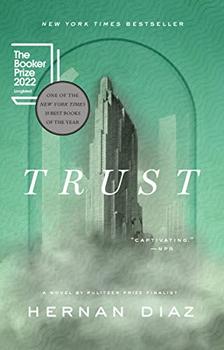Summary | Excerpt | Reading Guide | Reviews | Beyond the Book | Readalikes | Genres & Themes | Author Bio

A few stagnant years went by, during which he made halfhearted attempts at starting different collections (coins, china, friends), dabbled in hypochondria, tried to develop an enthusiasm for horses, and failed to become a dandy.
Time became a constant itch.
Against his true inclinations, he started planning a trip to Europe. All that interested him about the Old Continent he had already learned through books; experiencing those things and places was of no importance to him. And he did not look forward to being confined on a ship with strangers for days on end. Still, he told himself that if he ever would leave, this would be the proper moment: the general atmosphere in New York City was rather glum as the result of a series of financial crises and the ensuing economic recession that had engulfed the country for the last two years. Because the downturn did not affect him directly, Benjamin was only vaguely aware of its causes-it had all started, he believed, with the burst of the railroad bubble, somehow linked to a subsequent silver crash, leading, in turn, to a run on gold, which, in the end, resulted in numerous bank failures in what came to be known as the panic of 1893. Whatever the actual chain of events might have been, he was not worried. He had a general notion that markets swung back and forth and was confident that today's losses would be tomorrow's gains. Rather than discouraging his European excursion, the financial crisis-the worst since the Long Depression, two decades earlier-was among the strongest encouragements he found to leave.
As he was about to set a date for his journey, his banker informed him that, through some of his "connections," he had been able to subscribe to bonds issued to restore the nation's gold reserves, whose depletion had driven so many banks to insolvency. The entire issue had sold out in a mere half hour, and he had turned a handsome profit within the week. Thus, unsolicited luck, in the form of favorable political shifts and market fluctuations, led to the sudden and seemingly spontaneous growth of Benjamin's respectable inheritance, which he had never cared to enlarge. But once chance had done it for him, he discovered a hunger at his core he did not know existed until it was given a bait big enough to stir it to life. Europe would have to wait.
Rask's assets were in the conservative care of J. S. Winslow & Co., the house that had always managed the family's business. The firm, founded by one of his father's friends, was now in the hands of John S. Winslow Jr., who had tried and failed to befriend Benjamin. As a result of this, the relationship between the two young men was somewhat uneasy. Still, they worked together closely-even if it was through messengers or over the telephone, either of which Benjamin preferred to redundant and laboriously genial face-to-face meetings.
Soon, Benjamin became adept at reading the ticker tape, finding patterns, intersecting them, and discovering hidden causal links between apparently disconnected tendencies. Winslow, realizing his client was a gifted learner, made things look more arcane than they truly were and dismissed his predictions. Even so, Rask started making his own decisions, usually against the firm's counsel. He was drawn to short-term investments and instructed Winslow to make high-risk trades in options, futures, and other speculative instruments. Winslow would always urge caution and protest against these reckless schemes: he refused to put Benjamin in a position to lose his capital in hazardous ventures. But more than worried about his client's assets, Winslow seemed to be concerned about appearances and eager to display a certain financial decorum-after all, as he once said, laughing shallowly at his own wit, he was, if anything, a bookkeeper, not a bookmaker, in charge of a finance house, not a gambling house. From his father, he had inherited a reputation for pursuing sound investments, and he intended to honor this legacy. Still, in the end, he always followed Rask's directives and kept his commissions.
Excerpted from Trust by Hernan Diaz. Copyright © 2022 by Hernan Diaz. All rights reserved. No part of this excerpt may be reproduced or reprinted without permission in writing from the publisher.
Your guide toexceptional books
BookBrowse seeks out and recommends the best in contemporary fiction and nonfiction—books that not only engage and entertain but also deepen our understanding of ourselves and the world around us.